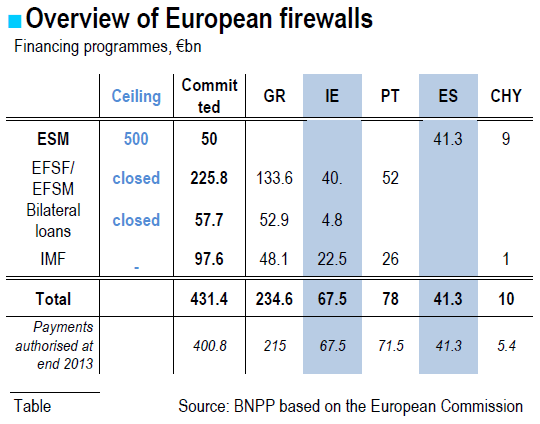On the whole, the survey and economic data released this week tend to support our scenario of a gradual improvement in the eurozone’s economic situation. After last week’s PMI indexes, other key indexes rose again in January, including business climate, the European Commission’s economic sentiment index (ESI) and Germany’s IFO index. They have almost returned to mid-2011 levels. The first estimates of Q4 2013 GDP growth were also positive. For most of the member states, data will not be available before 14 February, but the Belgian and Spanish statistics offices were more precocious. Since Belgium is a small but very open economy at the heart of the eurozone, it is considered to be a good indicator of business trends in the northern part of the region. Belgian growth accelerated slightly in Q4, up 0.4% q/q vs. 0.3% in Q3. In the southern part of the eurozone, Spain largely confirmed the end of the recession in H2 2013, with GDP up 0.3% q/q vs. 0.1% q/q in Q3.
These positive trends apparently will not be strong enough to fully reassure the ECB Governing Council, which meets in Frankfort next week for its monthly meeting. The Governing Council will surely note that money supply growth slowed sharply in December (to 1% y/y vs. 1.5% in November) and that inflation decreased further in January (0.7% according to Eurostat’s preliminary estimates released this morning).
The Eurogroup is confident
The good news about growth, in contrast, certainly contributed to the confidence that seems to reign among the eurozone’s finance ministers during this year’s first Eurogroup meeting. No official decisions were made, and most of the meeting was devoted to reviewing the economies benefiting from a European bailout programme.
At the end of the meeting, the Eurogroup’s president, Dutch finance minister Jeroen Dijsselbloem, welcomed the gradual improvement in the eurozone’s growth prospects. He pointed out that after Ireland in early December, in was now Spain’s turn, at the end of December 2013, to officially exit the financial assistance programme with the European Stability Mechanism. It is worth recalling that the scope of action of this programme is strictly limited to the recapitalisation of the Spanish banking sector, and in this respect, does not have any specific implications for Spanish economic policy1. To eliminate any doubts about the Spanish government’s capacity to restructure the banking sector, the Europeans pledged in mid-2012 to lend up to €100bn to Spain. In the end, only €41.3bn was necessary, most of which was paid out in December 2012. This provides a good occasion to review the European firewalls and their use (see table). Since 2010, five eurozone member states have benefited from financial aid2. Total commitments by the Europeans and the IMF amounted to roughly €430bn, more than half of which was lent to Greece. To date, the Irish and Spanish programmes are closed, in the sense that no further payouts are planned to these governments. Of course, the loans have not been reimbursed yet (Spain will begin reimbursing the capital borrowed from the ESM in 2022 and Ireland will begin paying back its EFSF loans in 2029). Lastly, note that with only €50bn mobilised out of €500bn in available funds, the European Stability Mechanism – now Europe’s sole defensive weapon – has largely preserved its lending capacity.
For the Eurogroup, the fact that these financial aid programmes are winding down without difficult, and that Ireland managed to regain full access to market financing, sends a strong signal that the European strategy is working and that the eurozone’s situation is improving. Hopes are high, notably among lenders, that Portugal will manage to do the same: its financing and macroeconomic adjustment programme ends next May3. As optimist as he may be, J. Dijsselbloem nonetheless remained cautious this week and simply stated that the Eurogroup had received assurances that corrective measures had been identified to offset the shortfall induced by the Constitutional Court’s recent decisions.

BY Frédérique CERISIER
